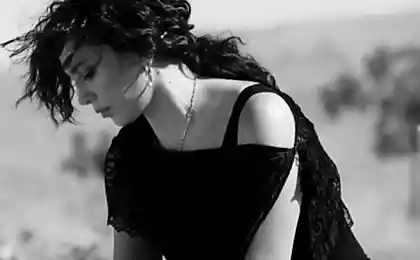506
Where does the anger
"Overflowing vessel pours out over the edge. So crowded and the human heart pours out in the middle of what it's full".
Simeon Of Athos
Imagine that each person is a vessel — jug, in which he places his emotions and feelings. For example, such a familiar emotion — anger! Yulia Utkina specifically for
So, the man was angry, but his anger not expressed, not expressed, left all to myself. And anger quietly sank to the bottom of the jug. It would seem that just a person educated, patient, and really Thrifty, as it saves a anger...
Time passes, unexpressed Sloboda accumulated, and again constrained: transformirovalsya in resentments, fears, resentment, irritation, sarcasm, etc., until it reaches its peak it turns into wrath, then in a state of aggression. And in that moment, when the metaphorical vessel overflows with the negativity poured out!
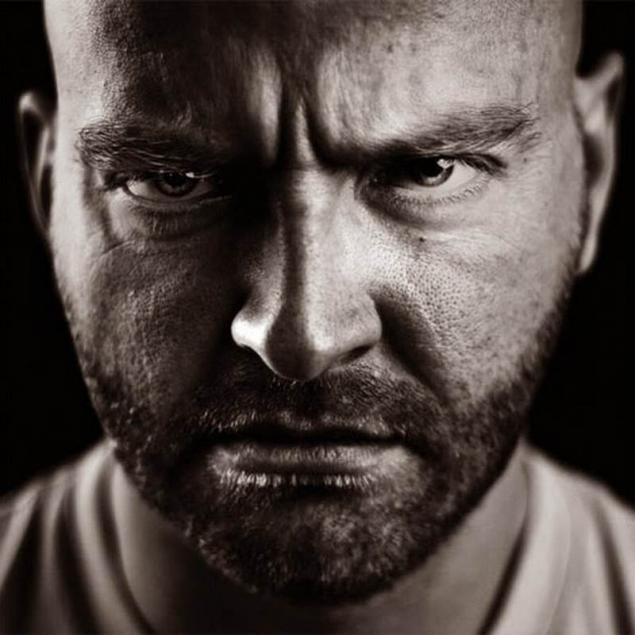
The person literally "blow up": he is in a state of extreme passion turns into a beast who yells not his voice, destroying furniture, throwing fists at others, destroys relationships, and myself... Because getting into a passion, the man turns off consciousness!
Through negative behavior of people screaming about how it hurt! And to understand this, you don't have to be a psychologist!
Why is this happening?
As you know, all of our adult issues come from childhood! In education, starting at an early age is the key to solving the mystery of how we allow ourselves to be angry, and how agressiruesh on others.
Let's make a small digression into childhood, specifically in parent-child relationships!
The child begins to exhibit negative emotions from the first days after birth! It is not yet possible to meet their needs: when he is hungry or he is cold, when negocio pain, when he's scared — no security, he gets angry and screams, screaming, crying, sobbing, telling everyone that he is now unbearable one!
In General, all these needs are reflected in Maslow's hierarchy of needs.
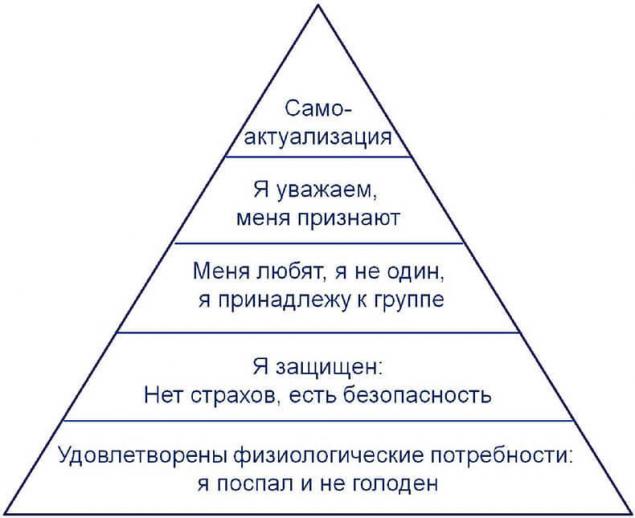
The baby grows and expresses anger the same way, which had received reinforcements from the adults taught him to be angry and show their anger to others ==> favorite relatives! The child looks at adults and copies their behaviors!
And copying, especially the mother, gets the scenario of conduct, which will be used later in the society!
Unfortunately, in my practice, I often meet with how boys and girls are forbidden to get angry! Children in the family constantly stopping in the manifestation of their anger and aggression, thereby cutting down the experience of children's agressivnie. Reasons them out first mom, and then all members of the family are connected to the process of repression!
Remember the "truths":
The list goes on: everyone in the family was (and maybe is still) a prohibition on anger.
Believe me, these "right" things delivered to a child in devastating form!
Because, stopping the anger, the adults interrupt the child is already agitated, excited, his negative energy has nowhere to go, held it, and either goes into irritation and/or covert form of anger, or finds an outlet in aggressive action!
And at this point, You get either restless, unruly offspring, with boundless enthusiasm, destroying everything and everyone in its path; or the child starts to be ashamed and blame themselves...
Herepossible variants of Chad understanding of what is happening:
* "When I get mad, I'm bad, and I don't like/don't want to be friends with me/don't respect/ avoid!"
* "When I get mad, I scare the other/ or scared!"
* "When I get mad, I get punished (beaten with a belt/deprived of something/out/toy taken away)!"
* Disappointing children's conclusion: "... anger is awful. And in any case, it is impossible to show to others, and especially to talk about her!"
There is internal conflict that can only lead to neurosis or psychosomatic, "I'm angry, but you can't do that! You need to be calmer, to be kind, to be as adults..."
It is importantto understand: anger is always a desire, unexpressed need, waiting.
What the child needs?
[However, as any adult!]
That give him a good parent:
And if you combine Maslow's Pyramid and our metaphorical "jar of emotions", then we get the following picture:
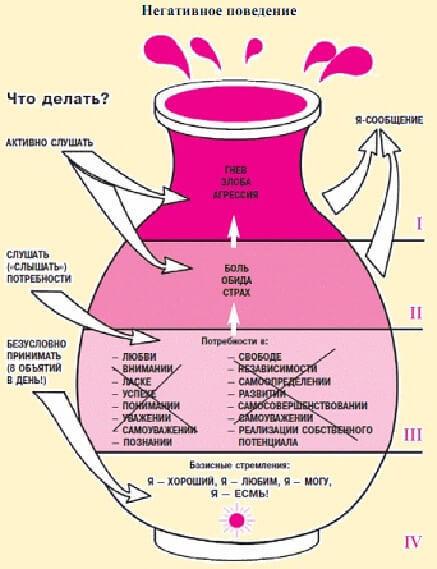
Because often, parents who meet only basic needs
physiology+protection), deprive their children of the chief — of understandingthemselves and their needs, the ability to hear and listen to and manage their emotions and feelings.
And turning to the psychologist, in order to give them a La the instructions: "How to make a child obedient? Driven? Comfortable?"
Usually at this point, I quote a classic:
"If there is something that we wish to change in the child, you need to first examine and see whether that would be better changed in ourselves."
Carl Gustav Young
So, dear moms and dads, pay attention to your anger and aggression! How will your child, including anger, depends on You!
What should I do?
To teach children the language of feelings, which is a universal and international — this is a simple process!
For example, between You in this conflict situation:
"I feel angry when you..." or "I know you're upset that..." and "I want to solve everything peacefully, help me with this!"
Also learnto talk about their feelings! Indicate your status with the words: "I am happy when you are carefully doing your homework," "I am too upset(and) that today could not walk together", "I see you're tired(a), let's get out of the room together!"....
Inthe end, acquaint your child with feelings!
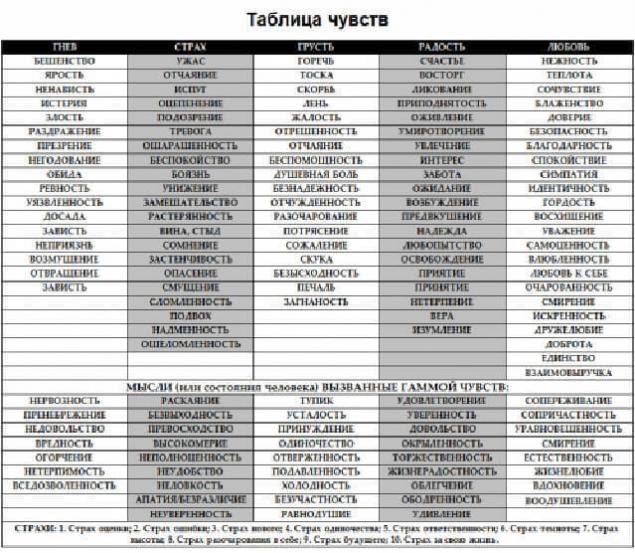
One example is the familiarity with the irritation.
"We experience irritation when something goes wrong, not working. This anger motivates us to attack. Often we don't know why we are angry and we all annoyed. Give a child the emotion of annoyance. The child is very hard to hold the emotion, if he did not understand what was happening to him. I remember my son was very surprised when one day I pointed out to him that it all annoying, because he had not eaten. Since then, with the irritability of hunger he began to cope much easier."
Gordon Neufeld
Important: to support the child in showing emotions while talking to him, if You are not satisfied with the actions with which he expresses them!
Example: "I saw how angry, how you run and bumped into a brother.
Angry you can, beat the brother — no! Because your brother was hurt and angry...
You can first safely say that you don't like without asking take your things. Or call me if brother ain't listening..."
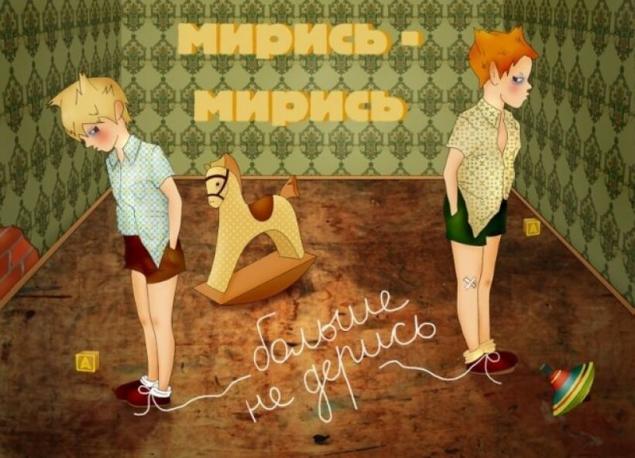
And finally, remember:
"Impatient, demanding the immediate satisfaction of desires, a complete lack of responsibility and attention to the feelings of others — all the typical properties of young children, it is quite forgivable. Patient work, responsibility for their actions and the attentive relation even to far people — this is the behavior characteristic of the Mature person."
Konrad Lorenz
From myself I will add: not to give up power in the family evil children, thus, "... on their heads go and nobody want to listen to" — be sustainable! Ask for help and support from your spouse, parents, those who you trust.
The conditional and the unconditional love of parents
LAW, not chance — your thoughts are real!
Explain to yourself and others that every person has the right to be angry and agressirovat without recording it in the category of "good or bad". Each emotional state can be used for good! published
Author: Yulia Utkina, especially for
Source: Yulia Utkina
Simeon Of Athos
Imagine that each person is a vessel — jug, in which he places his emotions and feelings. For example, such a familiar emotion — anger! Yulia Utkina specifically for
So, the man was angry, but his anger not expressed, not expressed, left all to myself. And anger quietly sank to the bottom of the jug. It would seem that just a person educated, patient, and really Thrifty, as it saves a anger...
Time passes, unexpressed Sloboda accumulated, and again constrained: transformirovalsya in resentments, fears, resentment, irritation, sarcasm, etc., until it reaches its peak it turns into wrath, then in a state of aggression. And in that moment, when the metaphorical vessel overflows with the negativity poured out!

The person literally "blow up": he is in a state of extreme passion turns into a beast who yells not his voice, destroying furniture, throwing fists at others, destroys relationships, and myself... Because getting into a passion, the man turns off consciousness!
Through negative behavior of people screaming about how it hurt! And to understand this, you don't have to be a psychologist!
Why is this happening?
As you know, all of our adult issues come from childhood! In education, starting at an early age is the key to solving the mystery of how we allow ourselves to be angry, and how agressiruesh on others.
Let's make a small digression into childhood, specifically in parent-child relationships!
The child begins to exhibit negative emotions from the first days after birth! It is not yet possible to meet their needs: when he is hungry or he is cold, when negocio pain, when he's scared — no security, he gets angry and screams, screaming, crying, sobbing, telling everyone that he is now unbearable one!
In General, all these needs are reflected in Maslow's hierarchy of needs.

The baby grows and expresses anger the same way, which had received reinforcements from the adults taught him to be angry and show their anger to others ==> favorite relatives! The child looks at adults and copies their behaviors!
And copying, especially the mother, gets the scenario of conduct, which will be used later in the society!
Unfortunately, in my practice, I often meet with how boys and girls are forbidden to get angry! Children in the family constantly stopping in the manifestation of their anger and aggression, thereby cutting down the experience of children's agressivnie. Reasons them out first mom, and then all members of the family are connected to the process of repression!
Remember the "truths":
- "A mother (for adults) to be mad not!"
- "Don't raise your voice to others!"...
- "Mad the bad and the ugly!"
- "To be angry is impossible, because:"... the evil radiated by you — you will certainly come back"...
The list goes on: everyone in the family was (and maybe is still) a prohibition on anger.
Believe me, these "right" things delivered to a child in devastating form!
Because, stopping the anger, the adults interrupt the child is already agitated, excited, his negative energy has nowhere to go, held it, and either goes into irritation and/or covert form of anger, or finds an outlet in aggressive action!
And at this point, You get either restless, unruly offspring, with boundless enthusiasm, destroying everything and everyone in its path; or the child starts to be ashamed and blame themselves...
Herepossible variants of Chad understanding of what is happening:
* "When I get mad, I'm bad, and I don't like/don't want to be friends with me/don't respect/ avoid!"
* "When I get mad, I scare the other/ or scared!"
* "When I get mad, I get punished (beaten with a belt/deprived of something/out/toy taken away)!"
- "When I get angry I become like a dad/mom/uncle Vanya, and it's very scary and bad (painful and ugly)". SoI was told (significant adults)!
* Disappointing children's conclusion: "... anger is awful. And in any case, it is impossible to show to others, and especially to talk about her!"
There is internal conflict that can only lead to neurosis or psychosomatic, "I'm angry, but you can't do that! You need to be calmer, to be kind, to be as adults..."
It is importantto understand: anger is always a desire, unexpressed need, waiting.
What the child needs?
[However, as any adult!]
That give him a good parent:
- incare==> respond to the basic aspirations,
- inattention==> the ability to hear and listen to their needs,
- infeedback==> the expression of emotions and feelings ==>speak them aloud, to show their attitude to what is happening.
- For the child, as a rule, do the older (parents, grandparents, caregivers, etc.):
"I see that you're getting mad! What you really want?"
And if you combine Maslow's Pyramid and our metaphorical "jar of emotions", then we get the following picture:

Because often, parents who meet only basic needs
physiology+protection), deprive their children of the chief — of understandingthemselves and their needs, the ability to hear and listen to and manage their emotions and feelings.
And turning to the psychologist, in order to give them a La the instructions: "How to make a child obedient? Driven? Comfortable?"
Usually at this point, I quote a classic:
"If there is something that we wish to change in the child, you need to first examine and see whether that would be better changed in ourselves."
Carl Gustav Young
So, dear moms and dads, pay attention to your anger and aggression! How will your child, including anger, depends on You!
What should I do?
To teach children the language of feelings, which is a universal and international — this is a simple process!
For example, between You in this conflict situation:
- Imagineyourself in the place of the child.
- Askyourself the question: "what would I felt(a) in his place?"
- Tell the child that You only felt, understood, realized.
- To acquaint the child with the range of emotions that You experience when meeting with his tantrums/insults/fights/neglect/insults and other things.
- To listen to his opinion, to learn about his emotional state, thoughts, plans...
"I feel angry when you..." or "I know you're upset that..." and "I want to solve everything peacefully, help me with this!"
Also learnto talk about their feelings! Indicate your status with the words: "I am happy when you are carefully doing your homework," "I am too upset(and) that today could not walk together", "I see you're tired(a), let's get out of the room together!"....
Inthe end, acquaint your child with feelings!

One example is the familiarity with the irritation.
"We experience irritation when something goes wrong, not working. This anger motivates us to attack. Often we don't know why we are angry and we all annoyed. Give a child the emotion of annoyance. The child is very hard to hold the emotion, if he did not understand what was happening to him. I remember my son was very surprised when one day I pointed out to him that it all annoying, because he had not eaten. Since then, with the irritability of hunger he began to cope much easier."
Gordon Neufeld
Important: to support the child in showing emotions while talking to him, if You are not satisfied with the actions with which he expresses them!
Example: "I saw how angry, how you run and bumped into a brother.
Angry you can, beat the brother — no! Because your brother was hurt and angry...
You can first safely say that you don't like without asking take your things. Or call me if brother ain't listening..."

And finally, remember:
"Impatient, demanding the immediate satisfaction of desires, a complete lack of responsibility and attention to the feelings of others — all the typical properties of young children, it is quite forgivable. Patient work, responsibility for their actions and the attentive relation even to far people — this is the behavior characteristic of the Mature person."
Konrad Lorenz
From myself I will add: not to give up power in the family evil children, thus, "... on their heads go and nobody want to listen to" — be sustainable! Ask for help and support from your spouse, parents, those who you trust.
The conditional and the unconditional love of parents
LAW, not chance — your thoughts are real!
Explain to yourself and others that every person has the right to be angry and agressirovat without recording it in the category of "good or bad". Each emotional state can be used for good! published
Author: Yulia Utkina, especially for
Source: Yulia Utkina












